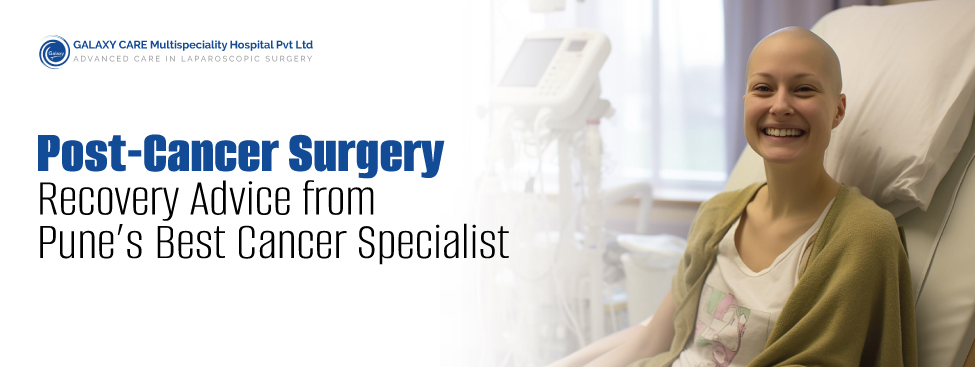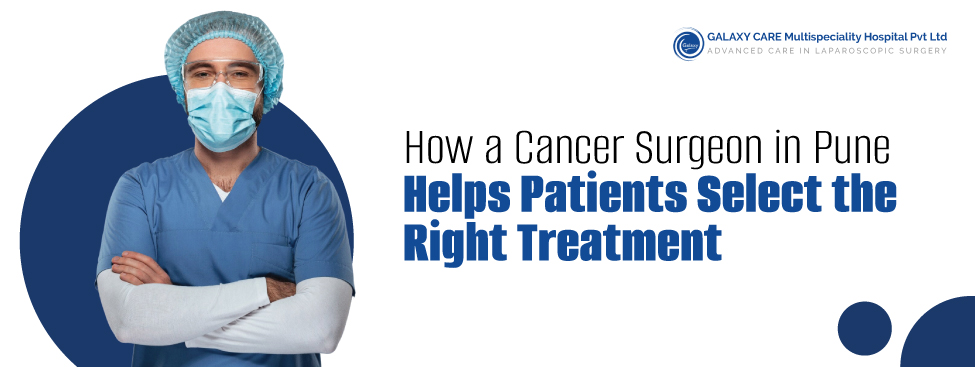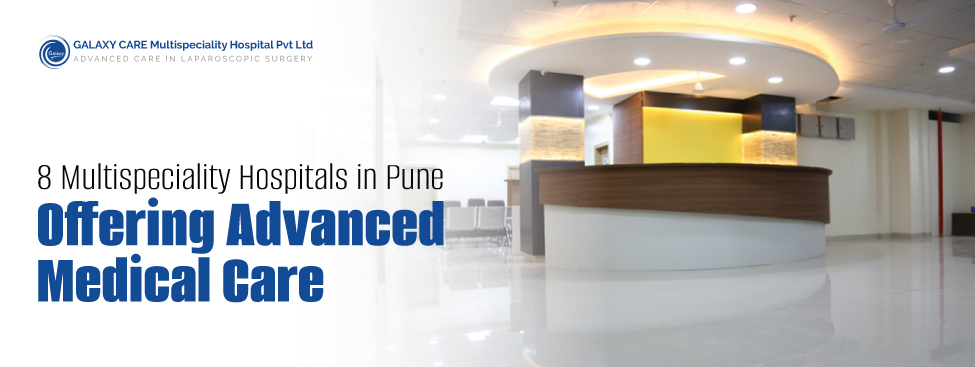
Post-Cancer Surgery Recovery: Advice from Pune’s Best Cancer Specialist
Recovering from cancer surgery is a journey that challenges both the body and the mind. Patients often face a whirlwind of emotions, relief, anxiety, hope, and uncertainty, while also experiencing physical discomfort, weakness, and lifestyle changes. These early days and weeks after surgery are pivotal: the right care can mean the difference between a smooth recovery and significant setbacks.
Why is post-surgery care so crucial?
It’s not just about healing wounds—it’s about regaining strength, preventing complications like infections or blood clots, and easing the path back to quality living. The value of expert, structured aftercare cannot be overstated. In this blog, Pune’s leading cancer specialist from Galaxy Care Hospital shares practical, evidence-based advice to help survivors thrive after surgery.
Understanding Post-Surgery Recovery
Typical recovery following cancer surgery involves a series of milestones: wound healing, regaining physical and mental strength, and effective pain control. Immediately after surgery, patients are monitored closely for vital signs, wound integrity, and signs of bleeding or infection. It is common to experience fatigue, nausea due to anesthesia or pain medication, appetite changes, and sometimes emotional stress or mood swings.
Common challenges include:
- Severe tiredness or weakness, which is a natural part of major tissue healing.
- Nausea, vomiting, and loss of appetite, making nutrition a persistent concern.
- Pain at the incision site, sometimes radiating to nearby areas.
- Emotional lows, ranging from anxiety about cancer recurrence to post-surgical depression.
Following your cancer surgeon’s guidance is essential. Resist the urge to accelerate your routine—overexertion can delay healing or cause complications. Every patient’s healing journey is unique, shaped by factors like age, other health conditions, the type and extent of surgery, cancer treatment history, and personal resilience. Thus, recovery plans must be personalized, regularly reviewed, and adjusted under the watchful eye of your care team.
Tips for Physical Recovery Post Cancer Surgery
Proper physical recovery is a blend of science, diligence, and patience:
Wound Care
- Wash hands thoroughly before handling dressings.
- Keep the surgical site clean and dry as instructed.
- Change dressings as advised by your surgeon and watch for redness, unusual swelling, or discharge—these could signal infection.
- Avoid applying ointments or powders unless recommended.
Pain Management
- Take prescribed pain medications on time; do not skip doses expecting to ‘tough it out.’
- Use supportive pillows and proper positioning to ease pressure on the operated area.
- Physical therapy, when recommended, helps gradually restore mobility and strength.
Gradual Activity
- Bed rest is important initially, but walking for a few minutes several times daily accelerates circulation and lung function, lowering the risk of blood clots or pneumonia.
- Light stretching, as guided by therapists, supports flexibility.
- Avoid strenuous activity and heavy lifting until cleared.
Sleep & Rest
- Prioritize quality sleep and frequent short naps if needed.
- Good rest enhances your body’s ability to heal and boosts immunity.
Evidence-Based Approach: Recent cancer rehabilitation studies show that Enhanced Recovery After Surgery (ERAS) protocols, which emphasize early mobilization, pain control, optimal nutrition, and team-based care, lead to faster recovery, fewer complications, and shortened hospital stays. At Galaxy Care Hospital, adopting similar structured protocols has been pivotal for outstanding results.
Nutrition and Hydration Post Cancer Surgery
Nutrition is a cornerstone of recovery. Surgery increases your body’s protein and calorie demands—without meeting them, healing is slower:
- Proteins (from eggs, lean meats, dairy, legumes) rebuild tissues and immune cells.
- Vitamins and Minerals (from vegetables, fruits, nuts) accelerate wound healing.
- Antioxidants fight inflammation and support the immune system.
Coping with Appetite Changes
- Eat small, frequent meals rather than three large ones.
- Try cold or bland foods if tastes or smells are bothersome.
- Avoid greasy, spicy, or overly sweet foods if they worsen nausea.
Hydration
- Aim to drink at least 8–10 glasses of fluid daily, unless advised otherwise.
- Include water, clear soups, herbal teas, and oral rehydration solutions.
- Dehydration worsens tiredness and slows healing—watch for dry mouth, dizziness, or reduced urine output.
Best Practice: Consult a hospital nutritionist for a tailor-made recovery diet, especially if you encounter eating difficulties. At Galaxy Care Hospital, every nutrition plan is customized in consultation with the treating cancer specialist to address each patient’s particular needs.
Emotional and Mental Well-being
Physical healing is just one side of the post-surgery equation. Anxiety about cancer recurrence, depression, post-traumatic stress, or a sense of isolation are common and valid reactions. Addressing these is vital for holistic recovery.
Strategies:
- Mindfulness & Relaxation: Deep breathing, meditation, or gentle yoga help ease tension and anxious thoughts.
- Counseling: Speaking to a professional therapist can equip you with coping tools.
- Support Groups: Sharing experiences with fellow survivors provides reassurance and new insights.
- Family Involvement: Staying connected with family, discussing fears openly, and celebrating small wins together builds resilience.
Follow-Up Care and Monitoring
Prompt, structured follow-up care is the foundation of safe cancer recovery:
- Regular Appointments: Ensure timely check-ups for wound assessment, physical exams, imaging, and lab tests to monitor overall recovery and detect early signs of issues or recurrence.
- Reporting Symptoms: Immediately inform your care team about fevers, sudden pain, swelling, redness, or unusual feelings—never ignore symptoms, as early action prevents major complications.
- Ongoing Care Coordination: The cancer specialist updates your rehabilitation and adjuvant treatment plan as needed, ensuring your pathway to full recovery stays on track.
Avoiding Common Recovery Pitfalls
Even with careful planning, post-cancer surgery recovery can face setbacks. Being aware of potential pitfalls helps patients stay on track and heal safely.
Recovery can be derailed by:
- Doing too much, too soon (overexertion)
- Ignoring new or worsening symptoms, assuming they’re “normal”
- Self-medicating, especially mixing over-the-counter remedies with prescribed drugs
- Skipping follow-up appointments or therapy sessions
Pune’s best cancer specialists agree—safe recovery demands vigilance, communication, and strict adherence to medical advice. When in doubt, always reach out for clarification before making changes to your routine.
The Bottom Line
Every cancer survivor’s recovery is a guided journey, not a solo battle. Personalized post-surgery care—spanning physical therapy, nutrition, mental health, and vigilant follow-up—maximizes healing and minimizes risks. At Galaxy Care Hospital, expert supervision ensures every step of your recovery is safe, compassionate, and effective.For comprehensive, compassionate post-cancer care, consult Pune’s best cancer specialist at Galaxy Care Hospital, where your health and well-being are our highest priorities, and every stage of your recovery is supported by expertise and empathy. Your cancer recovery journey matters, and we are committed to walking it with you. Together, we turn hope into healing.


